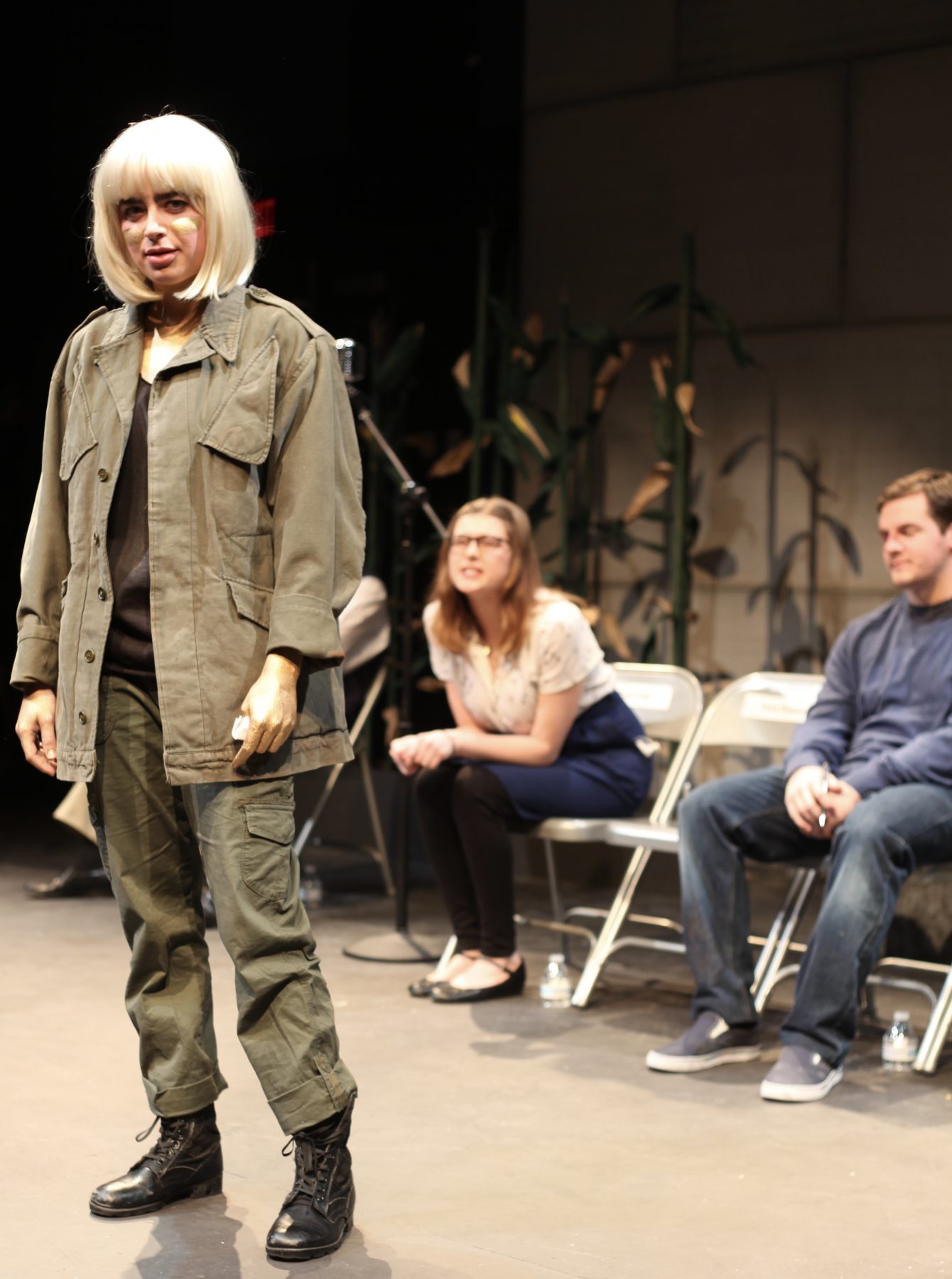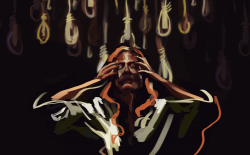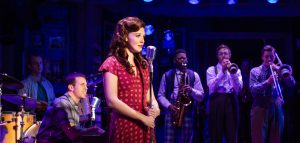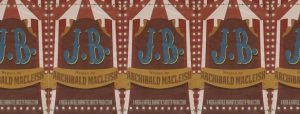One Flew Over the Cuckoo’s Nest, Lady Chatterly’s Lover, and Catcher in the Rye — what do these three books have in common?
They have, at some point, been banned within the United States.
While many of these novels are now considered classic, yet controversial, reads, they were once driven out of American classrooms, with many wondering what would happen to the minds and hearts of the younger generation should they get their hands on such material. One question, however, has always remained, even as these books have returned to the local shelves and school curriculums: did authors like J.D. Salinger know just how much of a stir their words could elicit? Do authors of such controversial books intend to jar the public in such a way, and intend to present various interpretations to various readers? Or, as fictional author Tobin Falmouth explains about his own work, “I wrote it because I had to?”
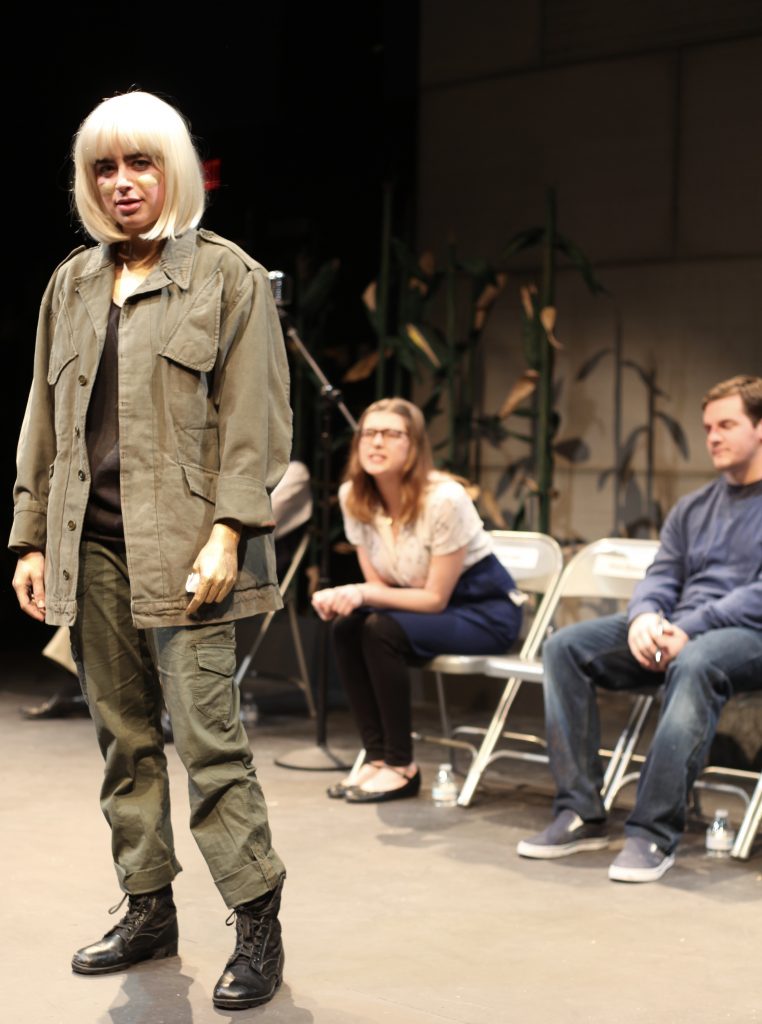

Brooke Dudek
Nomadic Theatre’s production of Adam Rapp’s The Metal Children brilliantly addresses these questions and more, exploring the power of the human spirit and the disconnect between rural and urban America. When the struggling Falmouth, played by Greg Keiser (COL’16), discovers his novel, also titled The Metal Children, has been banned by a local school board in Idaho due to its content regarding teen pregnancy and abortions, he is urged by his agent to visit the small town of Midlothia to personally defend his novel.
What follows is an intense clash of ideas, ranging from modern feminism to religious beliefs, particularly when Falmouth discovers his book has inspired a group of local teens to rebel in alarming ways. The lackluster author encounters several individuals who have created compelling and profound interpretations of his work, from eager English teacher Stacey Kinsella to rebellious yet riveting student Vera (respectively played by Conor Canning (COL ‘16) and Amanda Weiss (COL’16)). Yet while the individuals of Midlothia find humanity’s deepest truths within his text, Falmouth himself could not feel more disconnected from his own humanity, struggling to rediscover his “character and center” after his wife leaves him for another man.
While tackling such controversial issues head-on, The Metal Children leaves little to the audience’s imagination with harsh descriptions, moments of verbal and physical cruelty, and partial nudity. As Falmouth says, after all, “we live in an ugly world” — and he’s certainly not wrong. Despite the fact that Falmouth had written “The Metal Children” twenty-six years prior to the play’s events, the youth of Midlothia struggle under the same traditional grip, prevented from truly expressing themselves and discovering the flaws that, as Vera describes it, “make us all human.” Although certainly confronting heavy subject material, the production presents various moments of levity, alternating rapidly between the slapstick and the serious, the comedic and the catastrophic. In one moment, the audience will be laughing alongside Falmouth’s agent, Bruno, played by Andrew Walker (COL’16), as he berates Falmouth for his substance abuse and one-night stands — the next, the two characters are on Falmouth’s floor, as the dejected author mournfully asks, “Why did she leave me, Bruno?” These sharp, unexpected changes within the scene only heighten the play’s intensity, jarring the audience’s emotions and rendering us breathless from laughter in one moment, and breathless from shock and concern in the next.
Rapp’s play also introduces audiences to a host of beautifully complex characters, portrayed effortlessly and with captivating energy by Nomadic’s performers. Edith, played by Vanessa Chapoy (COL’18), wonderfully embodies the struggle of a small-town woman. While she may have memorized Falmouth’s work word by word, the local town’s motel owner simply can’t decide how she should feel about it, caught between what she has been taught as right and what she truly feels is right. Roberta Cupp, played by Emily Lett (COL’17), strikes the audience primarily as the religious zealot one would likely find in the cast of Inherit the Wind — until it is revealed that, like Falmouth, Cupp has experienced the pains of unimaginable loss and loneliness. While at times the modern audience member may want to berate the small-minded citizens of Midlothia, it is important for us to remember that individuals such as these still exist; breaking from the everyday norms, especially in isolation, can be close to impossible.
In the end, however, what does Falmouth’s work — or any author’s work — truly mean? Which interpretation is right — or is there any intention behind a novel at all? And is the author truly responsible should an audience take his or her interpretation to the extreme? “I think the show demonstrates the problems that a lot of authors and other artists have with intentionality,” wrote Keiser in an email to the Voice. “Some authors have a specific impact they want to make on their readers, whether politically, emotionally, or otherwise. But some, like Tobin, don’t really have any motive besides self-expression. Either way, no artist has control over the ways in which their art is interpreted.”
The Metal Children fearlessly confronts topics that today are still difficult to navigate, captivating the audience with boundless energy and passion for the subjects at hand. Although The Metal Children certainly addresses a rural-urban, insider-outsider dichotomy, the conversations had on stage are still beneficial for students to witness and participate in on campus today.
“I hope that the play starts a conversation,” wrote Walker in an email to the Voice. “I think that it is stylized and shocking in all the right places to take audiences to the point where they can’t not talk about what the play covers.”
While today’s world may certainly be entrenched in the digital age, it’s nice to be reminded, once in a while, of the power found within the pages of a good book.


